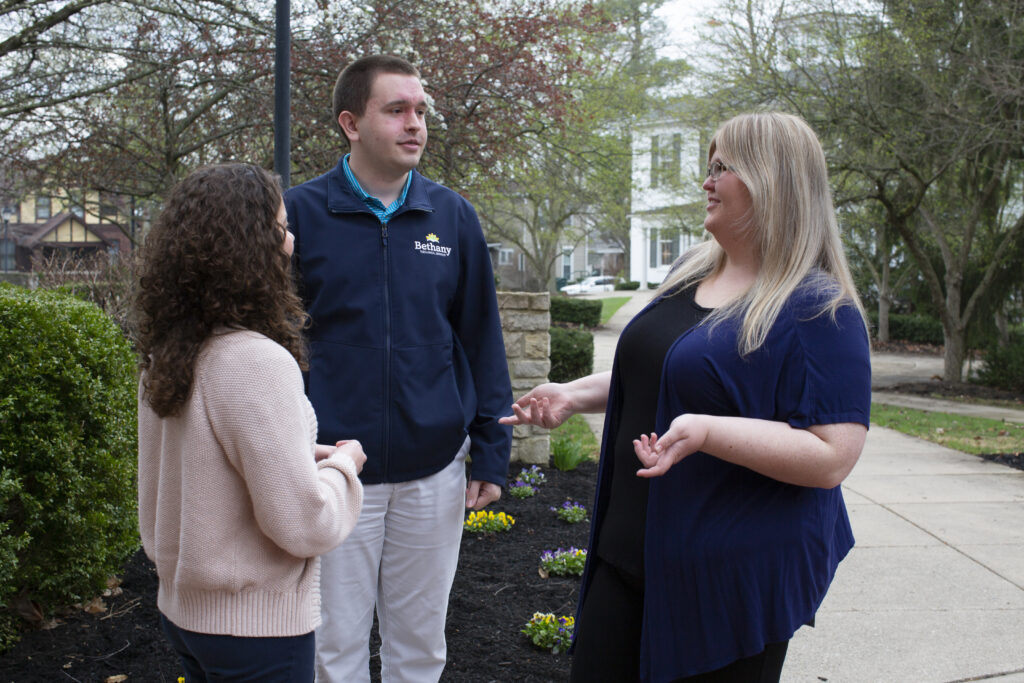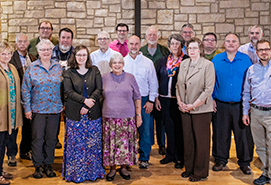The No-Debt Difference

By Jonathan Graham
A remarkable thing happened at Bethany this year: not a single student took out a student loan. This was not a random occurrence or a simple stroke of luck. Instead, the Seminary reached this milestone after a years-long, institution-wide effort to remove the financial barriers that too often prevent students from pursuing a seminary education. And while the institution did make changes in policies and practices that have helped reduce students’ levels of debt, it is the students themselves who deserve the most credit for this semester’s success.
Residential and distance learning students alike benefit from generous financial aid, but they have also bought into the idea that entering into Seminary provides an opportunity to examine one’s own priorities and habits, and perhaps make adjustments to assure a well-integrated and sustainable life.
A decade ago, Bethany students collectively took out about $300,000 annually in federal student loans. Given that many students who enter Seminary already have debt from their undergraduate years, taking on additional student loans could make it unsustainable to pursue careers in ministry and service. The issue is not unique to Bethany.
In 2013, Lilly Endowment awarded grants to 67 seminaries — including Bethany — to improve the “economic well being of future pastors.” That grant helped Bethany begin to reduce student indebtedness with the aspiration to help students graduate without additional debt.
“When we started this process, a debt-free seminary education was a pretty audacious goal,” recalls President Jeff Carter. “A decade later, we have made a lot of progress, but it is still a work in progress. The good news is the students are making this goal a reality.”
*
Connor Ladd, a third-year Master of Divinity student, admits that when he enrolled at Bethany, he didn’t completely understand the positive impact that attending Bethany could have on his financial life. As a recent Manchester University graduate who is answering a call to pastoral ministry in the Church of the Brethren, he knew that he would receive housing, a living stipend and scholarships — he just didn’t realize that his scholarships would cover the full cost of his tuition.
“That first semester, I was prepared to pay $1,100 for tuition. When I was told that my tuition was paid for, I realized that I could put that money towards paying off his undergraduate student loans.”
He recently paid off his loans in full. As a participant in the BOLD program for residential students, Ladd receives a full-tuition scholarship; other students pay $1,100 per semester.
“It’s a big weight off my shoulders not to have to worry about loans,” says Ladd. “Because I am not feeling that financial pressure, I have had a lot of opportunities that I probably wouldn’t have had otherwise.”
Ladd participated in a January travel course intensive in Atlanta, Georgia. He also had the opportunity to serve as an intern at Bethel AME Church in Richmond, where his duties included leading a weekly Bible study and preaching on occasion. Both of these opportunities were great learning experiences and connected him to communities that were diverse in terms of race, class, and gender. These experiences greatly enhanced his learning. Ladd doubts he would have been able to pursue such activities if he had been concerned about finances.
“Money ended up being a factor in the decisions I have made as a seminary student, but not in the way I expected,” says Ladd. “Because my basic needs are being met, I am able to take more risks and try new things. I have learned so much about myself and gained experience that I never would have gotten without Bethany.”
*
Terri Mitchell, financial aid and student services assistant, is the staff member who works directly with students to make sure they have a sustainable plan to finance their education.
“At first, a lot of students think Bethany’s financial aid sounds too good to be true,” says Mitchell. “When I talk to them about how it works, and when I explain how flexible Bethany is able to be, they are very grateful.”
As Mitchell explains it, the core of Bethany’s approach to financial aid is similar to how the Seminary approaches every other aspect of its educational mission — as a student-centered institution.
“We understand that not every student is the same, and we understand that some students do not have sufficient funds on hand to pay their tuition bill at the start of the semester,” says Mitchell. She works with students individually, often creating payment plans to meet their needs. “I have had a student pay $150 per week, because that’s what worked for them. The main thing is, we never want finances to be the reason someone decides not to enroll.”
From Mitchell’s point-of-view, Bethany’s no-debt aspirations help the institution attract students who are well suited to the Seminary and who will thrive in its programs. By not encouraging students to take out loans, and by instead working with them to find ways to finance graduate school without borrowing, Bethany is bringing in students who are already thinking about shaping their lives around ministry and service and positioning themselves to have successful and sustainable careers after graduation.
“I am really proud of our students,” says Mitchell. “They looked at all the pros and cons, and decided to make it work without loans. I also think they are very grateful to the donors who make it possible for them to make that choice.
*
Courtney Hess, special assistant to the president for strategic initiatives, has been instrumental in helping Bethany shift its policies and procedures to make it easier for students to graduate without debt. He also helped prepare grant applications that secured two large grants from Lilly Endowment that have provided important financial support for the effort. Over the past decades, the institution has learned a lot from the experiences of its students — including some who did end up taking out loans and others who felt the strain of balancing the demands of coursework, jobs, and community life.
Hess notes that it took a number of years, and a few starts and stops, before Bethany came up with a model for reducing debt that seems to work for most Bethany students. The Seminary took the step of freezing tuition, rather than doing what most colleges and universities do — raising tuition annually to keep up with inflation. The institution also chose to stop thinking of its student housing as a source of profit, as most institutions do. Bethany also now requires master’s degree students to participate in financial literacy training, encouraging students to create thoughtful budgets, and reflect on their own approaches to financial matters.
“What we have created is a little radical,” says Hess. “We recognize student agency in this process. Our job is to make sure we are doing everything possible to provide students with the information they need to make good decisions for themselves.”
Hess has put a lot of focus into Bethany’s efforts to reduce student borrowing, but he admits that it is unclear why exactly student borrowing fell to zero now, or whether this success will repeat in future semesters. It is crystal clear, however, that the generosity of donors and the changes in policies and procedures have made a positive difference.
“A lot of our Connections students have jobs, so that makes it easier for them to make tuition, and our commitment to keep costs as low as possible make a big difference,” he says. “The question is, what will it take to make zero loans a normal, everyday feature of a Bethany education?”
####
This article appeared in the Winter 2025 issue of Wonder & Word magazine.








 Green Circle: Bethany invests in 100% renewable energy.
Green Circle: Bethany invests in 100% renewable energy.